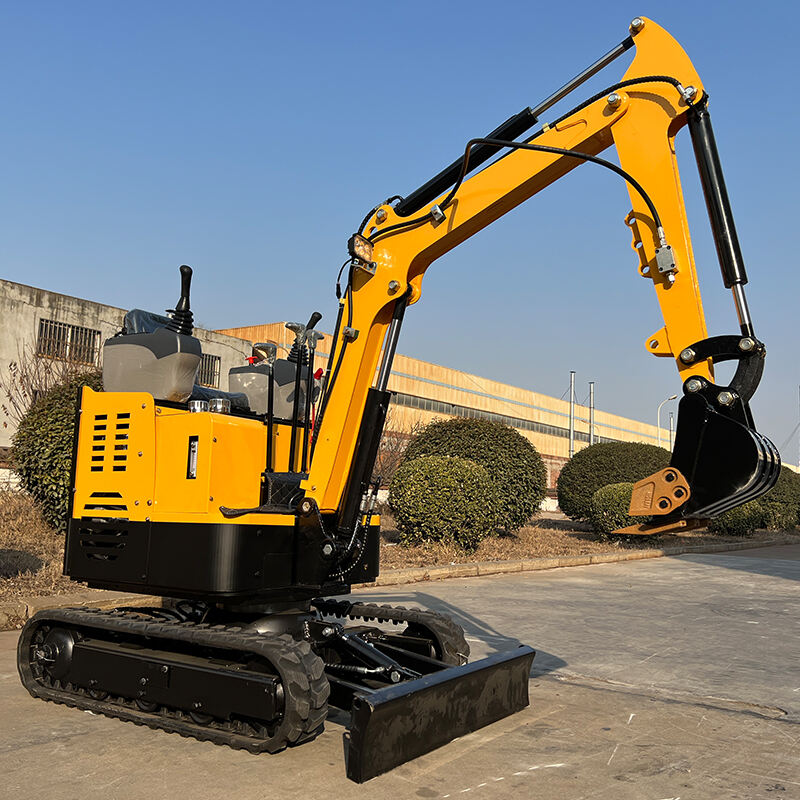Understanding the Critical Role of Excavators in Construction Site Development
In the dynamic world of construction and land development, excavators stand as the backbone of effective site preparation. These powerful machines transform raw terrain into construction-ready foundations, making them indispensable in modern construction projects. From clearing vegetation to precise grading, excavators combine versatility with power to tackle the most demanding site preparation challenges.
The evolution of excavator technology has revolutionized how construction teams approach site preparation. Modern excavators feature advanced hydraulic systems, precision controls, and intelligent machine capabilities that enhance productivity while reducing project timelines. This technological advancement has made excavators even more crucial in achieving optimal site conditions for construction success.
The Multifaceted Applications of Excavators in Site Preparation
Land Clearing and Initial Ground Breaking
Before any construction can begin, the site must be cleared of obstacles and vegetation. Excavators excel at this fundamental task, efficiently removing trees, stumps, and surface vegetation. Their powerful hydraulic systems can handle everything from small brush to large tree removal, preparing the ground for subsequent development phases.
The versatility of excavator attachments makes them particularly effective during this initial phase. Specialized buckets, grapples, and hydraulic thumbs allow operators to tackle various materials and conditions, ensuring thorough site clearing while minimizing environmental impact.
Precision Grading and Soil Management
Once the initial clearing is complete, excavators play a crucial role in achieving proper site grading. Using laser-guided systems and GPS technology, operators can create precise slopes and elevations essential for proper drainage and foundation preparation. This accuracy is particularly important in preventing future water accumulation and soil erosion issues.
Modern excavators equipped with grade control systems can maintain exact specifications throughout the grading process, reducing the need for rework and ensuring consistency across large areas. This precision not only improves the quality of site preparation but also significantly reduces project timelines and costs.
Advanced Features Enhancing Site Preparation Efficiency
Intelligent Machine Control Systems
Today's excavators incorporate sophisticated technology that transforms site preparation accuracy and efficiency. GPS-enabled systems provide real-time positioning data, allowing operators to work with unprecedented precision. These intelligent controls help maintain exact grades and depths, reducing human error and increasing productivity.
Machine control systems also enable operators to work from digital site plans, ensuring that every aspect of the preparation meets design specifications. This technology integration has revolutionized how contractors approach site preparation, making it more efficient and cost-effective.
Hydraulic System Innovations
Advanced hydraulic systems in modern excavators deliver improved power management and fuel efficiency. These systems enable smooth, precise control over attachments while maintaining optimal power output. The result is more effective site preparation with reduced fuel consumption and environmental impact.
Enhanced hydraulic capabilities also mean better performance in challenging conditions, such as working with hard soil or in confined spaces. This versatility makes excavators invaluable across various site preparation scenarios, from urban development to remote construction sites.

Environmental Considerations in Modern Site Preparation
Sustainable Excavation Practices
Modern site preparation emphasizes environmental responsibility alongside efficiency. Today's excavators feature eco-friendly technologies that reduce emissions and minimize soil disturbance. Operators can implement precise excavation strategies that preserve natural drainage patterns and protect surrounding ecosystems.
Advanced excavator designs also incorporate features that reduce ground pressure and prevent unnecessary soil compaction. This attention to environmental impact ensures that site preparation activities maintain the long-term stability and health of the development area.
Material Management and Recycling
Excavators facilitate effective material sorting and recycling during site preparation. Their versatility allows for careful separation of different materials, from topsoil to construction debris, enabling proper resource management and reducing waste. This capability is increasingly important as construction projects face stricter environmental regulations.
The ability to precisely handle and stockpile materials also supports sustainable construction practices, allowing teams to preserve and reuse valuable resources throughout the project lifecycle.
Planning and Optimization of Site Preparation
Site Analysis and Project Planning
Successful site preparation begins with comprehensive planning that considers soil conditions, topography, and project requirements. Excavators play a central role in this phase, as their capabilities influence how efficiently the work can be completed. Modern planning tools can simulate excavator operations to optimize work sequences and material handling.
Project managers use sophisticated software to coordinate excavator operations with other site preparation activities, ensuring smooth workflow and minimal downtime. This strategic approach maximizes the efficiency of excavator usage while maintaining project timelines.
Productivity Monitoring and Optimization
Advanced telematics systems in modern excavators provide valuable data on machine performance and operator efficiency. This information helps project managers optimize site preparation activities and identify areas for improvement. Real-time monitoring ensures that excavators are utilized effectively throughout the project.
Performance data also supports preventive maintenance scheduling, reducing unexpected downtime and maintaining consistent progress in site preparation work.
Frequently Asked Questions
What size excavator is best for site preparation?
The ideal excavator size depends on the project scope and site conditions. Medium-sized excavators (20-30 tons) are typically versatile enough for most site preparation tasks, offering a good balance of power and maneuverability. Larger sites or more demanding conditions may require larger machines, while compact excavators are better suited for confined spaces or smaller projects.
How do weather conditions affect excavator operations in site preparation?
Weather significantly impacts excavator operations during site preparation. Wet conditions can make soil unstable and harder to work with, while extreme temperatures affect hydraulic system performance. Modern excavators include features to maintain productivity in various weather conditions, but project planning should account for potential weather-related delays.
What role do excavator attachments play in site preparation?
Attachments greatly expand an excavator's versatility in site preparation. Common attachments include various bucket types, rippers, hydraulic hammers, and grading blades. These tools allow a single machine to perform multiple tasks efficiently, from breaking rock to final grading, reducing the need for additional equipment on site.
Table of Contents
- Understanding the Critical Role of Excavators in Construction Site Development
- The Multifaceted Applications of Excavators in Site Preparation
- Advanced Features Enhancing Site Preparation Efficiency
- Environmental Considerations in Modern Site Preparation
- Planning and Optimization of Site Preparation
- Frequently Asked Questions

